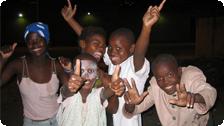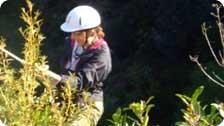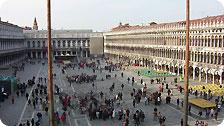Inspiration: Durban, South Africa: Children of God
by Kisha Montgomery
The other night, I went with a local NGO to warn street children in Durban that the police were planning a raid the next day to sweep about forty of them off the street.
Typically, the police will gather the children in vans. They will then either trump up charges and send them to prison for months—sometimes years—or (especially when international visitors are coming to town), take them hours away and drop them off around two o’clock in the morning in the middle of a forest, forcing them find their way back alone in the dark on foot.
Other times, they will try to force them into rundown, white-operated, and culturally ineffective shelters. The result is that the children run away and end up back on the streets. Many children run away to escape poverty. They run from bleak possibilities and tin shacks with no lights, electricity, or running water. Street life is harsh—but maybe they will find something there, and something is better than the nothing they are fleeing.
I met one woman who, like the majority of black South Africans, was suffering from the country’s high unemployment rate. She lived in a shack with her husband and two children and sold recycled materials for a minimal income. She wanted education for her children, but wasn’t able to send them to school. I wondered how they would study, as she had no electricity.
There are so many street children in Durban (and every place that I visited in Africa) that they are viewed as pests, unwanted annoyances, and a waste of space. One day when I was having breakfast, a young boy attempted to steal a few packets of sugar from the restaurant. The manager chased after him and grabbed his dirty third-hand shirt, which easily fell off his emaciated body. As we approached the manager to ask that she return the shirt to the child, she became irate and warned him that she would tell him off before she gave it back. He was just a street child. In her eyes, he was nothing at all.
The night we went to warn the children, I was nervous as we approached their torn and ratty beds, shared by twelve at a time. I was not sure what to say. What do you say? None of them were older than sixteen, and the youngest was maybe six or seven years old. Many did not have shoes and their clothes were torn and dirty. Many of the girls had turned to prostitution and many were HIV positive. As we spent time with them, one of the girls began to cry, because her HIV diagnosis was confirmed. She had been tested before, but thought that it would go away.
Another girl needed help because she had what looked like cauliflower coming out of her and her pee burned as it exited. She was thirteen and had become a commodity mostly taken advantage of by Indian and white men who came to visit and stayed in the nearby hotels.
Durban is the epicenter of prostitutes. At night, you can see all the little girls attempting to sell their bodies for a little bit of food or maybe for shoe glue, sold at Indian stores for about a dollar and often shared by several children. I was shown the prostitutes from Eastern Europe, who are among the few white women you find working as prostitutes here. They are part of human trafficking, often run by Nigerians. Maybe they come for jobs, maybe they come to hook, but they are soon put on drugs (mostly crack and possibly heroin) and are addicted for life. They die quickly, so the demand is constant—as are the payoffs at the borders.
Others were having a hard time walking, the glue they were inhaling in plastic bottles or bags having caused a condition that makes twelve-year-olds walk like old men. Others had scars from being attacked. One little girl I met had her eye cut out when she refused to have sex with an older man. We brought them food and drink. They inhaled four or five slices of bread at a time. They were so hungry. Ironically, as they saw us approaching, they hid their glue out of a combination of respect and shame. One little boy put his glue bottle in his underpants.
I did not know what to say, so I offered to take their photos. They were so excited! Their smiles were bright and their laughter pierced the dark night as I showed them their images on my digital camera. I was happy to be a catalyst for joy. I decided to abandon words and turn to action. I smiled at them and hugged them. I was happy to let them know they were seen and heard, and that their lives counted, no matter what society said. I was glad to remind them that they too, were children of God.
* * * *
Kisha Montgomery traveled in Africa from April to August 2005 to support foundations in their grantmaking efforts in South Africa and Tanzania. She wrote this piece while visiting a community-based organization that worked to support street children. You can learn more about Kisha at www.creativesoul.us.
Discover more from Tango Diva
Subscribe to get the latest posts sent to your email.






